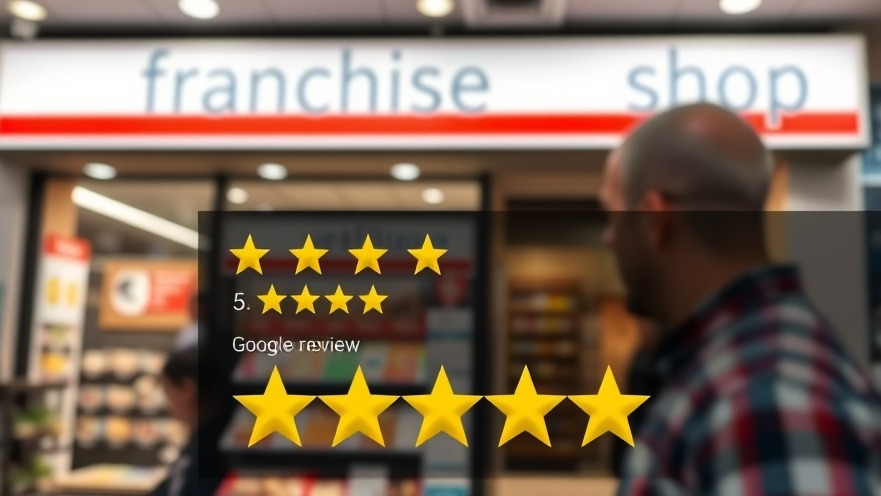
Understanding the Franchise Review Dilemma
In the highly competitive landscape of franchising, customer reviews have emerged as a fundamental element influencing consumer decisions. With platforms like Yelp and Google Reviews dominating consumer feedback, the ownership of review strategies has become a critical conversation point between franchisors and franchisees. As businesses face real-time public scrutiny, a coherent review strategy is essential for both sides, yet many remain unsure of their roles and responsibilities.
The Essential Nature of Online Reviews
As organic as word-of-mouth may seem, online reviews represent a powerful digital transformation of that tradition. An astonishing 90% of consumers trust online reviews as much as personal recommendations, as corroborated by findings from franchise.org. This trust plays a pivotal role in shaping perceptions and reality within the franchise universe. A negative review for one franchise location doesn't just tarnish the individual site; it poses a risk to the brand's overall reputation, multiplied by the weight of collective franchise visibility.
This interconnected view of reputation means that a poor review doesn’t merely reflect on local customer service but can ripple through the brand's image across franchises, creating a dire need to prioritize online reputation management. Moreover, with almost half of consumers indicating they trust review content akin to advice from friends, franchisors and franchisees must recognize the immense potential and influence that positive reviews hold.
Collaborative Strategies for Reputation Management
The challenge, then, lies in establishing who takes the reins in managing reviews. The partnership between franchisor and franchisee should be symbiotic; each has unique insights that can lead to a more polished brand image. Franchisors can set policies and best practices for responding to reviews, while franchisees bring in the granularity of local customer interactions.
This dual approach can not only enhance the quality of responses but also foster a sense of community and loyalty. By developing a clear set of guidelines that encourage prompt responses—both positive and negative—franchisors can help franchisees feel supported rather than overshadowed. This creates a loyal customer base and reassures potential clients about the franchise network's commitment to service.
When Things Go Wrong: The Importance of Tone
A case study involving a busy restaurant franchise illustrates the potential pitfalls of ineffective review responses. Following a negative review, the franchisee's knee-jerk reaction involved defensively attributing the issue to a busy night without addressing the core customer complaint. The subsequent fallout revealed just how damaging such responses could be, necessitating a franchisor's intervention for damage control.
This situation underscores the necessity of crafting responses that exhibit empathy, taking full advantage of the customer service opportunity presented by reviews. A proactive and thoughtful approach can significantly mitigate public relations setbacks, turning a potential crisis into an opportunity for improvement and connection.
Future Trends in Franchise Reputation Management
As the digital landscape evolves, so too will the expectations surrounding online reviews. Going forward, franchises will need to stay agile, leveraging emerging technologies like AI-driven sentiment analysis to predict consumer behavior and adapt strategies proactively. The generation of innovative customer engagement initiatives, such as personalized follow-ups based on review sentiment, may also become the norm.
Moreover, an increased digital focus will likely drive further integration between franchise systems and customer feedback platforms. Leaders in franchise systems must remain vigilant in establishing processes that align their operational objectives with the fast-paced dynamics of online reputation management.
Actionable Insights for Franchisors and Franchisees
Franchisors and franchisees must collaborate strategically to optimize online review management. Consider these actionable insights for effective practice:
Create a centralized review management policy: Align on processes and tone with clear guidelines to foster consistency across feedback responses.
Encourage transparency and communication: Maintain open lines of dialogue, allowing insights from franchisees to shape franchisor strategies.
Utilize technology for efficiency: Explore tools that can track, manage, and analyze customer feedback across platforms to inform operational improvements.
Foster customer relationships: Engage with reviews to build trust, affirming customers feel valued and heard.
As the franchising landscape continues to evolve, those who approach reviews with strategy and empathy are most likely to build resilient, thriving franchises.
 Add Row
Add Row  Add
Add 




Write A Comment